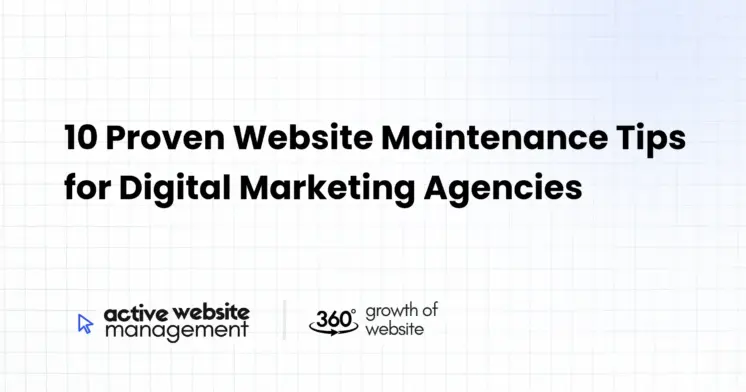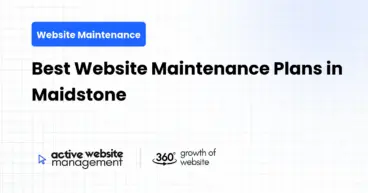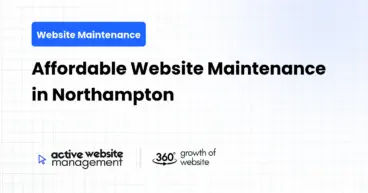January 23, 2025
17 min read
Running a successful digital marketing agency is like juggling flaming torches while riding a unicycle – it’s exciting, demanding, and requires constant focus. One of the most crucial, yet often overlooked, aspects of this balancing act is website maintenance. Your agency website isn’t just an online brochure; it’s your digital storefront, your primary lead generation tool, and a testament to your expertise. A neglected site sends the wrong message and can cost you potential clients. This article delves into 10 proven website maintenance tips specifically tailored for digital marketing agencies, helping you keep your online presence sharp, effective, and conversion-ready. We’ll explore what, why, when, and how to implement these strategies, along with the myriad benefits they offer. Let’s get started and transform your agency’s website into a well-oiled marketing machine.
1. Consistent Content Updates: Keeping Your Message Fresh and Relevant
Why Content Freshness Matters
Imagine walking into a bakery and seeing the same stale bread on display every day. You wouldn’t be too impressed, would you? Similarly, a website with outdated content signals neglect and can make your agency look out of touch. In the dynamic world of digital marketing, trends shift rapidly. What was cutting-edge yesterday can be old news today. Keeping your content fresh not only demonstrates that your agency is on top of industry changes but also improves your website’s SEO (Search Engine Optimization) ranking. Search engines favor websites that are regularly updated with new, relevant information.
How to Keep Content Fresh
- Regular Blog Posts: Aim for a consistent blogging schedule. Share your latest insights, case studies, and industry news. Don’t just write for the sake of it; create high-quality, valuable content that your audience will genuinely appreciate. This is a cornerstone of any solid marketing website upkeep plan.
- Update Service Pages: Review and update your service descriptions regularly. Do you offer new services? Have you refined your approach to existing ones? Ensure your service pages accurately reflect your current offerings and expertise. This is a crucial aspect of agency site care.
- Refresh Case Studies: Share your successes! Regularly update your case studies to showcase your best work and demonstrate the results you’ve achieved for your clients. This provides social proof and solidifies your agency’s credibility.
- Review and Revise Existing Content: Don’t just focus on new content; revisit and revise old posts to ensure they’re still accurate and relevant. Update statistics, add fresh insights, and optimize for SEO.
Don’t Just Maintain Your Website—
Grow It using Active Website Management! Don't Wait for Growth—Accelerate It with Active Website Management
Benefits of Consistent Content Updates
- Improved SEO: Fresh content signals to search engines that your site is active and relevant, which helps improve your rankings.
- Increased Engagement: New content provides more reasons for visitors to return to your site and engage with your brand.
- Enhanced Credibility: A regularly updated website demonstrates that your agency is knowledgeable and up-to-date with the latest trends.
- Stronger Lead Generation: Quality content can attract and engage potential clients, ultimately leading to more leads and conversions.
2. Technical SEO Audits: Ensuring Your Site is Search Engine Friendly
Why Technical SEO Matters
Technical SEO is the foundation of your online visibility. It focuses on optimizing your website’s structure, code, and performance to make it easier for search engines to crawl and index. If your website’s foundation is weak, no amount of content marketing will make up for it. A technically sound website is essential for achieving good search engine rankings and attracting organic traffic. Think of it as the under-the-hood work that helps the engine run smoothly.
How to Conduct a Technical SEO Audit
- Website Speed: Use tools like Google PageSpeed Insights to analyze your website’s loading speed. Optimize images, leverage browser caching, and minimize HTTP requests to improve performance. A slow site drives away potential clients and hurts your search ranking.
- Mobile-Friendliness: Ensure your website is fully responsive and provides a seamless experience across all devices, from desktops to smartphones. Google prioritizes mobile-first indexing, so a mobile-unfriendly website is a major liability.
- Site Architecture: Check your website’s structure for clarity and crawlability. Ensure your pages are logically linked and that your site map is up-to-date. A well-organized site is easier for both users and search engines to navigate.
- Schema Markup: Implement schema markup to provide search engines with more information about your content. This helps search engines understand your content and can improve your visibility in search results.
- Crawl Errors: Regularly monitor your Google Search Console for crawl errors and resolve them promptly. These errors can prevent search engines from indexing your pages.
Benefits of Technical SEO Audits
- Improved Search Rankings: A technically sound website is more likely to rank higher in search results.
- Better User Experience: Fast, responsive websites provide a better experience for users.
- Increased Organic Traffic: Higher rankings and better user experience lead to more organic traffic to your site.
- Reduced Bounce Rate: A fast and user-friendly website keeps visitors engaged, which reduces the bounce rate and increases the chances of conversion.
- A cornerstone of a proper SEO firm maintenance plan
3. Regular Security Scans: Protecting Your Site and Your Data
Why Security is Paramount
In today’s digital landscape, cybersecurity is not optional; it’s a necessity. As a digital marketing agency, you are often entrusted with sensitive client data, which makes your website a potential target for cybercriminals. A security breach can not only compromise your data and your clients’ information, but also severely damage your reputation. Regular security scans are an essential part of website maintenance, helping you identify vulnerabilities and protect your online assets.
How to Conduct Regular Security Scans
- Use Security Plugins: Implement reliable security plugins that can scan your website for malware, vulnerabilities, and suspicious activity. Many robust plugins offer real-time protection.
- Keep Software Updated: Ensure that your CMS, themes, and plugins are always updated to the latest versions. These updates often include security patches that protect against known vulnerabilities.
- Strong Passwords: Enforce the use of strong, unique passwords for all user accounts. Use a password manager to store complex passwords securely.
- SSL Certificate: Ensure your website has a valid SSL certificate, which encrypts data transmitted between your website and users, protecting sensitive information.
- Regular Backups: Implement a system for regular website backups. In case of a security breach, backups allow you to restore your website to its previous state, minimizing downtime.
- Use of firewalls: Implement a firewall to prevent unauthorized access to your website
Benefits of Regular Security Scans
- Data Protection: Protect your and your clients’ sensitive data from cyber threats.
- Reputation Management: Avoid reputational damage caused by security breaches.
- Business Continuity: Ensure your website remains operational, minimizing downtime due to security incidents.
- Trust and Credibility: Demonstrate to clients that you prioritize security and are trustworthy partners.
- Peace of Mind: Know that your website is secure, allowing you to focus on other aspects of your business.
Don't Wait for Growth—Accelerate It with
Active Website Management Don't Wait for Growth—Accelerate It with Active Website Management
A high-performing website is not just about speed; it’s about providing a seamless and enjoyable experience for your visitors. Slow loading times, broken links, and other performance issues can lead to frustration and make potential clients leave your website without converting. Consistent performance monitoring is crucial for identifying issues early and ensuring that your website operates smoothly and efficiently. This also greatly ties into good marketing website upkeep.
- Uptime Monitoring: Use uptime monitoring tools to track your website’s availability and receive alerts if your site goes offline.
- Page Load Speed: Regularly monitor your website’s page load speed using tools like Google PageSpeed Insights. Identify and resolve any bottlenecks that are slowing down your website.
- Broken Links: Regularly scan your website for broken links and fix them promptly. Broken links create a bad user experience and can hurt your search engine ranking.
- User Behavior: Analyze user behavior using tools like Google Analytics. Identify areas of your website that users are struggling with, and make improvements based on your findings.
- Server Performance: Ensure your server is performing optimally. Monitor server load, memory usage, and other parameters to identify and resolve any issues that could impact your website’s performance.
- Improved User Experience: A fast and reliable website provides a better experience for users.
- Increased Engagement: Users are more likely to engage with a website that loads quickly and is easy to navigate.
- Higher Conversion Rates: A positive user experience is critical for increasing conversion rates.
- Improved SEO: Website speed and performance are factors in search engine rankings.
- Reduced Downtime: Consistent monitoring helps you identify and resolve issues before they cause significant downtime.
5. Regular Backups: Protecting Your Data from Loss
Why Regular Backups are Essential
Imagine losing all your website data due to a server crash, a hack, or a simple mistake. The implications would be devastating. Regular backups are like an insurance policy for your website, ensuring that you can quickly recover from any unforeseen event. They are a fundamental aspect of website maintenance.
How to Implement Regular Backups
- Automated Backups: Set up automated backups that are performed daily or weekly, depending on the frequency of changes to your website.
- Offsite Storage: Store your backups offsite, such as in the cloud, to protect them in case of a server failure or a local disaster.
- Backup Testing: Regularly test your backup restoration process to ensure that you can quickly and effectively restore your website in case of a problem.
- Database Backups: Ensure that your database is backed up regularly, as it contains all your content, settings, and other important information.
- Multiple Backup Points: Keep multiple backup points to ensure a backup is always accessible.
Benefits of Regular Backups
- Data Protection: Protect your website data from loss due to accidents, hacks, or other unforeseen events.
- Faster Recovery: Minimize downtime by quickly restoring your website from a backup.
- Business Continuity: Ensure that your business can continue running even if your website experiences problems.
- Peace of Mind: Know that your website data is safe and that you have a backup plan in place.
6. Link Audits: Maintaining a Healthy Link Profile
Why Link Audits are Important
Links are like the highways of the internet, connecting websites to each other. They are a crucial factor in SEO, but not all links are created equal. A healthy link profile consists of high-quality, relevant links that point to your website. Conversely, toxic or broken links can harm your website’s ranking. Regular link audits help you identify and address issues with your link profile. This is an important, yet often overlooked, aspect of agency site care.
How to Conduct Link Audits
- Analyze Inbound Links: Use tools like Ahrefs or SEMrush to analyze your website’s inbound links. Identify and disavow any low-quality or spammy links.
- Check for Broken Links: Regularly scan your website for broken links, both internal and external. These links create a poor user experience and can hurt your search engine ranking.
- Monitor Anchor Text: Review the anchor text used in your inbound links. Ensure that it’s relevant and natural. Overly optimized anchor text can be seen as manipulative by search engines.
- Competitive Analysis: Analyze your competitors’ link profiles to identify opportunities for gaining high-quality links to your website.
- Internal Linking: Ensure a good internal linking structure within your site to improve SEO and user experience.
Benefits of Link Audits
- Improved SEO: A healthy link profile helps improve your website’s search engine ranking.
- Better User Experience: Fixing broken links enhances user experience and keeps visitors engaged.
- Penalty Avoidance: Avoid penalties from search engines due to toxic links.
- Competitive Advantage: Identify opportunities to gain high-quality links and gain a competitive edge.
- Overall healthier SEO firm maintenance plan
7. SEO Optimization Checks: Staying Ahead of the Curve
Why SEO Optimization Checks are Necessary
SEO is a constantly evolving field. What works today might not work tomorrow. Regular SEO optimization checks are necessary to stay ahead of the curve and ensure that your website is fully optimized for search engines. This goes beyond just technical SEO and delves into the actual content and keyword usage.
How to Conduct SEO Optimization Checks
- Keyword Research: Conduct regular keyword research to identify the keywords that your target audience is using to find digital marketing agencies. Update your content and meta descriptions to include these keywords.
- On-Page Optimization: Review your on-page optimization, including title tags, meta descriptions, headers, and image alt tags. Ensure they are optimized for your target keywords.
- Content Analysis: Analyze your website content to ensure that it’s engaging, informative, and optimized for search engines. Update or remove content that is no longer relevant.
- Competitor Analysis: Analyze your competitors’ websites to identify opportunities for improvement. Look at their content, keyword usage, and linking strategies.
- Track Rankings: Regularly track your website’s search engine rankings to identify areas where you are performing well and areas where you need to improve. Use this data to refine your SEO strategy.
Benefits of SEO Optimization Checks
- Higher Search Rankings: Stay ahead of the competition with continuously optimized content and website elements.
- Increased Organic Traffic: Higher search engine rankings lead to increased organic traffic to your site.
- Targeted Traffic: Attract the right audience to your website by using the keywords that they are searching for.
- Improved ROI: Increased traffic and conversions lead to a higher return on your marketing investments.
- Adaptation to ever-changing search algorithm: Ensuring your site does not lose visibility.
8. User Experience (UX) Audits: Keeping Your Audience Engaged
Why UX Audits are Crucial
A website that is beautiful but difficult to navigate will likely frustrate visitors. User experience (UX) is all about making your website intuitive, easy to use, and enjoyable for your audience. Regular UX audits help you identify areas where your website can be improved to provide a better experience for your users, which is a huge part of marketing website upkeep.
How to Conduct UX Audits
- Usability Testing: Conduct usability tests with real users to see how they interact with your website. Observe their behavior and identify areas where they encounter difficulties.
- Navigation Analysis: Review your website’s navigation to ensure it’s clear, logical, and easy to use. Ensure that visitors can quickly find what they are looking for.
- Mobile Experience: Test your website’s usability on mobile devices. Ensure that it is fully responsive and provides a seamless experience across all screen sizes.
- Conversion Funnel Analysis: Analyze your conversion funnels to identify bottlenecks that are preventing visitors from converting into clients.
- Heatmaps and Click Tracking: Use heatmaps and click tracking tools to see how users are interacting with your website. This data can help you identify areas where you need to make changes.
Benefits of UX Audits
- Improved User Satisfaction: Provide a better experience for your visitors, which leads to increased satisfaction.
- Higher Engagement: A well-designed website encourages visitors to engage with your content and your brand.
- Increased Conversions: Improve the flow of your website and simplify the conversion process.
- Reduced Bounce Rate: Keep users engaged on your site longer and reduce the bounce rate.
- Stronger Brand Perception: A well-designed and user-friendly website contributes to a more positive brand perception.
9. Accessibility Checks: Ensuring Inclusivity
Why Accessibility is Important
Accessibility is about making your website usable by everyone, including people with disabilities. It’s not just about being ethical; it’s also good for business. An accessible website reaches a wider audience and complies with accessibility laws. Ignoring accessibility can alienate a significant portion of potential clients, making it a crucial aspect of agency site care.
How to Conduct Accessibility Checks
- Use Accessibility Tools: Use automated tools to identify accessibility issues on your website. These tools can check for issues such as insufficient color contrast, missing alt tags, and poor keyboard navigation.
- Manual Testing: Conduct manual testing to ensure that your website is fully accessible. This includes testing with screen readers, keyboard navigation, and other assistive technologies.
- Web Content Accessibility Guidelines (WCAG): Ensure that your website complies with the WCAG guidelines. These guidelines provide a framework for creating accessible websites.
- Alternative Text: Provide alternative text for all images and other non-text elements. This allows screen readers to describe the content to users with visual impairments.
- Keyboard Navigation: Ensure that all website elements can be accessed using keyboard navigation.
Benefits of Accessibility Checks
- Wider Audience Reach: Reach a broader audience, including people with disabilities.
- Ethical Responsibility: Meet your ethical obligations to create an inclusive website.
- Legal Compliance: Comply with accessibility laws and regulations, avoiding potential penalties.
- Improved SEO: Accessibility can also improve your SEO ranking as search engines favor websites that are usable by everyone.
- Stronger Brand Image: Demonstrate that you care about all potential clients.
10. Active Website Management: Ensuring Continuous Optimization and Growth
Finally, the tenth tip that ties all the others together is active website management. All of the above tips will have the most impact when treated as part of an overall program. For this, consider a dedicated resource, such as Active Website Management, which offers comprehensive services to manage, maintain, and optimize websites for agencies like yours. This helps you take the worry and labor out of the process, ensuring your website is always in top condition without taking you away from your core business.
Why Active Website Management is Essential
- Focus on Core Business: Spend your time and resources on core business activities, such as client work, rather than on website maintenance.
- Expert Support: Benefit from the expertise of website maintenance professionals who are skilled in all aspects of website management.
- Continuous Improvement: Ensure that your website is continuously monitored and optimized, driving optimal results.
- Cost-Effective Solution: Save money by outsourcing website maintenance rather than hiring and training in-house personnel.
- Peace of Mind: Gain peace of mind knowing that your website is in capable hands.
What Active Website Management Offers
- Proactive Maintenance: Regular checks and updates to ensure your website is always functioning optimally.
- Performance Monitoring: Continuous monitoring of website speed, uptime, and other performance metrics.
- Security Monitoring: 24/7 monitoring for security threats and proactive measures to protect your website.
- SEO Optimization: Ensuring that your website is fully optimized for search engines.
- Content Updates: Assistance with content creation and updates.
- Backup Management: Regular backups and data recovery support.
- Technical Support: Prompt support for all website-related issues.
Benefits of Active Website Management
- Improved Website Performance: A faster, more reliable website that performs optimally.
- Enhanced Security: Protection from cyber threats and data breaches.
- Increased Traffic and Conversions: Improved SEO and user experience lead to more traffic and conversions.
- Reduced Risk: Avoid unexpected issues and downtime.
- Scalable Solution: Your website support scales with your business growth.
By incorporating these 10 proven website maintenance tips, including a strategic focus on Active Website Management, your digital marketing agency can ensure its website is not just an online presence but a powerful tool for lead generation, client acquisition, and overall business growth. Remember, your website is a reflection of your agency’s expertise; treat it as the valuable asset it is, and it will contribute significantly to your long-term success. The journey to a well-maintained website is continuous, but with the right strategies and commitment, your agency will reap the rewards of a polished and optimized online presence.







